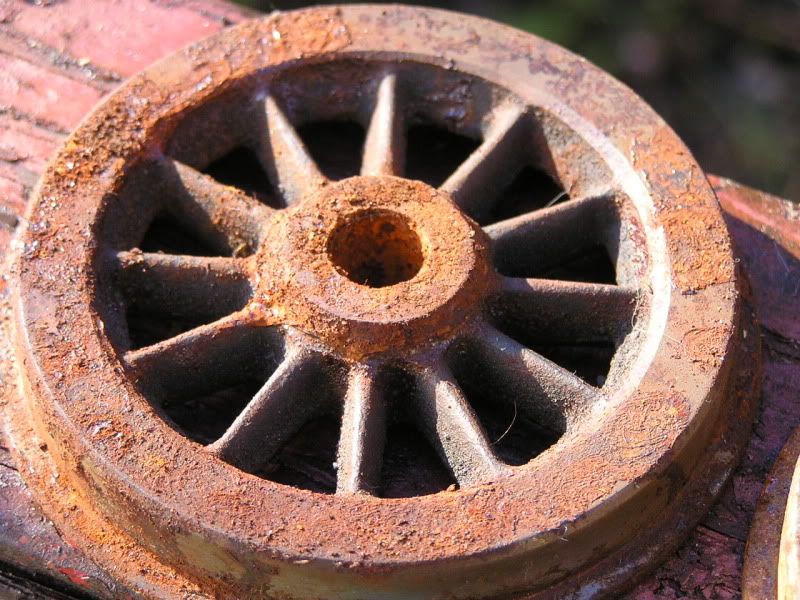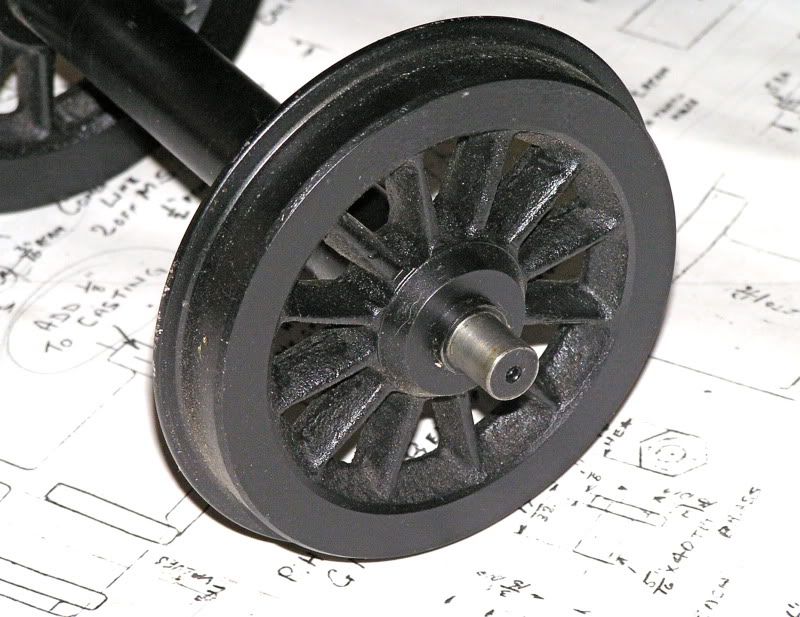|
|
Post by electrosteam on Dec 21, 2010 21:04:11 GMT
I have purchased a quantity of Citric Acid crystal powder to be trialled as a general-purpose pickling and cleaning agent.
The first job will be to clean some small welded steel brackets of mill scale prior to painting.
Later, I will be attempting my first copper boiler silver soldered assembly.
Any advice on the concentrations to be used - powder weight to water volume ?
John.
|
|
chiptim
Part of the e-furniture

Posts: 270
|
Post by chiptim on Dec 22, 2010 8:35:32 GMT
John,
I use citric acid for pickling copper. I can't find the advice that I followed to mix it but seem to remember about 10Kg of crystals in 25L of water for a 1-2 hour pickling time.
However the concentration is not that important because it affects the pickling time not how well it cleans. A very weak solution works just as well if you leave it overnight.
Regards Tim.
|
|
|
|
Post by alanstepney on Dec 22, 2010 9:27:03 GMT
BUT, keep the batches apart, one for the copper boiler and one for the steel.
|
|
|
|
Post by Deleted on Dec 22, 2010 10:00:12 GMT
BUT, keep the batches apart, one for the copper boiler and one for the steel. Am intrigued - as a novice at this hobby could you explain (not technical stuff, hopefully a simple answer ;D) why separate batches? Many thanks, A |
|
|
|
Post by electrosteam on Dec 22, 2010 10:01:01 GMT
The first test started 8 hours ago.
The maximum solubility is reported in Wikipedia to be 730 g / litre.
The same reference quoted the washing of glassware in a 6% solution.
I used 500 g in 5 litres for the steel brackets, 100g/l, so I have a relatively weak solution.
I just inspected the job and can report success already.
The black scale comes off by wiping with a cloth.
I will leave it overnight (it is 9:00 pm here) anyway.
There is a very slight evolution of gas, so the pail is in the middle of the backyard.
I will have to dig out my university chemistry books to assess the strength of a 100g/l solution. Is it 10%, 14% (1/7 maximum solubility) or some other value.
The same books should give me an idea on the gas produced (no obvious odour).
The advice on the separation of the tanks for the two materials will be followed.
John.
|
|
chiptim
Part of the e-furniture

Posts: 270
|
Post by chiptim on Dec 22, 2010 11:08:56 GMT
Alasdair if you mix batches the steel gets plated with ...erm...something from the copper batch that looks like copper but not sure what it is...
Someone else can add the technical detail...I just know not to mix them and saw what happened to the steel screws that went in by mistake...
Good enough?
Tim
|
|
|
|
Post by Deleted on Dec 22, 2010 12:19:01 GMT
Tim - many thanks. Certainly good enough for me - all I need to do now is remember the advice when pickling in future  Regards, A  |
|
|
|
Post by electrosteam on Dec 22, 2010 22:01:07 GMT
An update at 8:00 am, a total of 20 hours in the brew.
Steel is clean with a coating.
A painted item shows significant removal of paint (unknown type), some areas bare of paint and some show undercoat.
Hand brushed the items with a stainless steel brush, the coating moves around with the brush but does not come off completely.
Hand wiping removes the coating producing a black goo that stains the skin.
Perhaps the goo is the oil/dust/grease/other residue liberated from the mill scale.
The items will be power brushed with a rotary head later today.
One aspect, the surfaces rust noticeably in a very short time if exposed to air.
Re-immersion removes the rust just as quickly.
John.
|
|
chiptim
Part of the e-furniture

Posts: 270
|
Post by chiptim on Dec 23, 2010 8:07:38 GMT
John,
glad it works OK and yes you're quite right the items don't leave the acid all sparkling and clean, they need further work. I find that a good blast with a hose pipe gets the black stuff off provided its been pickled sufficiently.
I've never pickled steel (intentionally) so your observations regarding the formation and removal of rust are interesting.
Tim
|
|
|
|
Post by Jim on Jan 9, 2011 11:49:12 GMT
I've never pickled steel (intentionally) so your observations regarding the formation and removal of rust are interesting. Tim For just the removal of rust I soak the items in a container of cold black tea. The rust turns to a black sludge that is easily scrubbed/washed off. The tender wheels for Boadicea had spent quite some time in water as the photo shows but was easily cleaned in black tea.   Jim. |
|
russell
Statesman
  Chain driven
Chain driven
Posts: 762
|
Post by russell on Jan 10, 2011 16:18:19 GMT
The tender wheels for Boadicea had spent quite some time in water as the photo shows but was easily cleaned in black tea. Can you still drink the tea afterwards? The iron should be good for you ;D Russell. |
|
|
|
Post by Jim on Jan 10, 2011 20:10:01 GMT
Yep I serve it to my model engineer mates as 'Footplate Tea'. It puts hairs on your chest not like that limpwristed teabag stuff.  Jim |
|
Noddy
Statesman
 
Posts: 672
|
Post by Noddy on Jan 12, 2011 12:42:28 GMT
A good strong solution of citric acid keeps much better than a weak one. It's strong enough to stop bugs growing in it.
Don't be tempted to follow "advice" to add bleach, you'll just be wasting both and releasing chlorine gas which will make you cough and everything else go rusty.
|
|
joegib
Seasoned Member

Posts: 123
|
Post by joegib on Jan 23, 2011 13:11:35 GMT
John, I use citric acid for pickling copper. I can't find the advice that I followed to mix it but seem to remember about 10Kg of crystals in 25L of water for a 1-2 hour pickling time. Regards Tim. Erm, is this right? In English that's 22lbs dissolved in 5½ gallons! Looking on Ebay (OK, not the cheapest place), the going rate per Kg is around £5. That's £50 for less than a couple of buckets of pickle! Even John's(electrosteam) 'weak solution' would cost £12.50 for an equivalent volume of pickle. In the past I've picked up the impression that using citric acid is a cheap and safe form of pickling — just pop into Tesco's for a bag of crystals and you're done! Going by this discussion, cheap it ain't (unless my maths have gone badly awry). For ferrous metals at least, surely electrolytic pickling would be far cheaper than this? Joe (whose financial value system ossified about 1980!) |
|
chiptim
Part of the e-furniture

Posts: 270
|
Post by chiptim on Jan 23, 2011 21:04:02 GMT
Joe, it was at least a couple of years ago. I remember the package was a big heavy-duty bag in a corrugated box and I think I paid £10-£15 for it but you're right it might have been 5kg not 10kg. Either way I thought £15 to pickle a 7 1/4" boiler was good value and it's still working now on my second boiler now.
Regards Tim
|
|
chiptim
Part of the e-furniture

Posts: 270
|
Post by chiptim on Feb 3, 2011 13:49:58 GMT
Just to confirm I've found the remains of the citric acid and it was 5Kg in 25L of water for a 1-2 hour pickling time. When the mixture is very cold (just a few degrees) the pickling time increases markedly.
Regards Tim
|
|
joegib
Seasoned Member

Posts: 123
|
Post by joegib on Feb 4, 2011 6:10:04 GMT
Hi Tim,
Thanks for the further information.
Joe
|
|